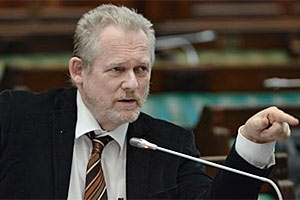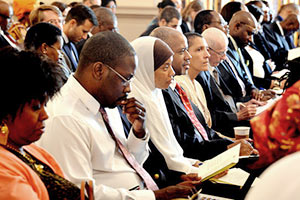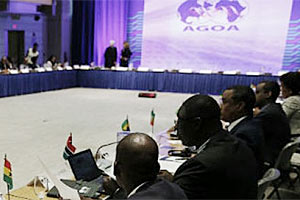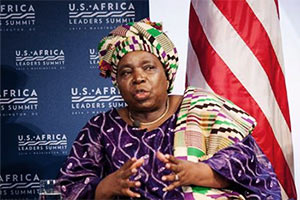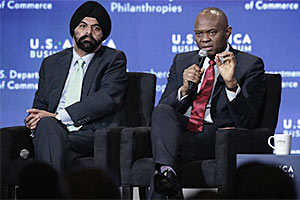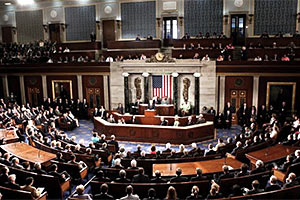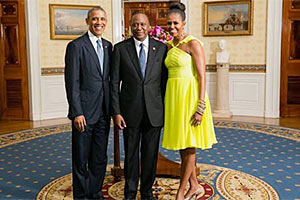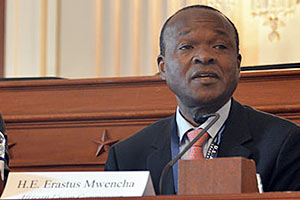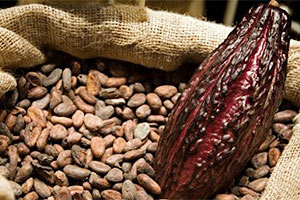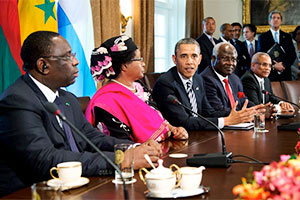On September 30, 2015, the African Growth and Opportunity Act will expire. The act provides duty free access to the United States, and if it lapses could threaten 62,395 jobs in South Africa alone.
African trade ministers will have bad memories of September deadlines. In 2012, a vital component of AGOA that facilitates the export of textile goods was renewed with days to spare. At that point, orders for African textiles goods had already dropped by 35 percent.
The problem then, as now, was uncertainty - investors and clients are unwilling to work with African manufacturers in a climate in which vital competitive factors like AGOA are up in the air.
While the Obama administration has assured a full renewal of AGOA, the divided and schizophrenic United States Congress must draft and approve the legislation. With a domestic approval rating of 15 percent and endless partisan deadlock, uncertainty is Congress's speciality. To overcome this uncertainty, AGOA countries need to plan for all possible scenarios, of which three are most likely.
Scenario 1: Full renewal of AGOA
The most likely scenario is a full renewal of AGOA - in which the current 40 eligible countries maintain duty-free access to the U.S. market on 1800 tariff lines, giving African exports a competitive edge.
This would safeguard the gains of AGOA, which have included contributing to a 78 percent increase overall trade and a 514 percent increase in automotive exports. But renewal must be accompanied by an effort to overcome the limitations of the deal.
Aside from South Africa, exports from AGOA countries continue to be dominated by energy, which account for 88 percent of total exports to the U.S. Half of AGOA eligible countries barely make use of their preferences, exporting less than U.S. $1 million dollars to the U.S. Huge agriculture subsidies and complex health and safety rules mean African agriculture goods are often uncompetitive in the U.S. market, and pressure from textile manufacturers in East Asia has undermined much of the expansion in trade seen under AGOA. To truly benefit from AGOA, Africa's export basket needs to be diversified, and the renewal process should work towards this aim.
First, AGOA should be extended for a longer period of ten to 15 years, in order to provide the certainty investors need. Second, programmes to provide technical assistance to navigate the complexities of entering the U.S. market, such as the U.S. Trade Hubs programme, should be expanded. And third and most important, work needs to be done to overcome the infrastructure gap that holds back Africa's competitiveness. An expansion of the innovative Power Africa plan, which aims to develop electrical capacity on the continent, would be an excellent step in this direction.
Improvement in these areas will assure AGOA fulfils its promise, turning low tariffs into real competitive market access.
Scenario 2: Renewal of AGOA without South Africa
South Africa is perhaps most at threat of losing AGOA preferences. The country has been described by critics as a “rich country with lots of poor people”, who argue that as a middle-income country, South Africa should no longer qualify for AGOA access. This position is supported by influential lobby groups in the U.S. pork, poultry and beef industries, which bemoan their lack of access to the South African market. While much of this criticism is likely a bargaining position to try and improve access for U.S. agriculture interests, the threat of South Africa being graduated from AGOA still remains.
Removing South Africa from AGOA would be counter-productive. It would not only directly threaten thousands of South African jobs, but would critically limit the effectiveness of the broader AGOA program. Small, less developed countries rely on large hub countries like South Africa in order to enter manufacturing value chains.
It is unreasonable, for example, to expect Namibia to develop a competitive automotive parts industry in the short lifespan of an AGOA renewal. It is, however, very possible for Namibia to supply components that feed into South Africa's pre-existing manufacturing infrastructure - supplying, for example, the leather used in car seats.
Keeping South Africa in AGOA provides an indispensable partner that can help other African countries bridge productive gaps in the short term, and thus tap into the full developmental potential of AGOA.
Scenario 3: An EPA-Type Deal
AGOA is currently a unilateral preference, in which the United States provides access to their market without asking for anything in return. If the deal was to end, it would likely be through an attempt to transform it into a two-way trade agreement, in which African states have to open their markets to U.S. Importers.
This would follow the path taken in Africa-European Union relations, in which unilateral preferences are abandoned in favour of Economic Partnership Agreements (EPAs) that provide complete access to the EU market in return for the liberalisation of 75 percent of African tariff lines. The EPAs are in their final stages, and it is going to become increasingly difficult to justify denying access to the U.S. while granting it to Europe.
Despite this, any attempts by the United States to negotiate EPA-style deals now would be misguided. A deal signed now will be incompatible with a 21st century Africa or a 21st century America. In the best case scenario, such a deal would grant the U.S. slightly better access to goods markets, but would be very unlikely to include any agreement on issues such as trade in services, investment protection or intellectual property rights - and it is exactly those factors that should matter to a future U.S.-Africa trade deal. The backbone of the United States' economy is the services industry, and the next frontier for growth in global services trade is Africa. The United States should negotiate when they are most likely to gain the most in areas like services, and this is not that moment.
Whatever scenario materializes, the United States would do well to heed the lesson of the EU's EPA negotiations. Ten years of bitter negotiations have put immense strain on the EU-Africa relationship, at the very moment in which China is outspending everyone on the continent, and emerging partners like India and Japan are deepening their engagement.
The world is waking up to the promise of Africa, and the realisation that this promise can best benefit them when Africa is on their side. With a renewal of AGOA, the United States can score a major win in the battle for the hearts and minds of the African continent. It is an investment that will rise in value as the continent does.
Christopher Wood is research fellow at the South African Institute of International Affairs in Johannesburg.



